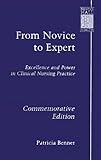Rating: 




It is true that nursing as a profession has changed rapidly over the last 25 years, and of course, as with all students, nurses have to prioritise on the latest written information. However, this 1984 publication, well respected as a reflective text, really reaches the heart of what nursing is all about, what motivates people to become nurses, what is expected of nurses in practice, how to address the fears we have as nurses, and how you can go the extra mile and develop the art of expert nursing practice. And as importantly, how people instinctively know the difference between an expert nurse, and the few for whom it is just a job.
This is a well written analysis of a craft, not a textbook, it makes you reflect on your nursing practice, and in contrast to those who promote a single approach, it has a universal, timeless appeal, hence could be profitably read by any in the caring professions.
Some quotes I found insightful: `A young man had returned to thank nurses who had cared for him during a protracted, complicated illness. Their genuine and imaginative care during his long period of pain and helplessness had made a profound impression on him. He wanted to tell them that their care had changed his world. He had never imagined that anyone could have been as helpless, unattractive, and with so little in the way of social exchange as he had been, and yet, to be so cared for.. his former perspective, that life is a contract and you get only what you earn, broadened to a view that sometimes you get what you cannot ask or barter for.’ An illustration of what we insist on calling `the therapeutic relationship’.
Also, to quote a scenario that neatly mirrors one I personally witnessed, and I do not repeat it here simply to say how great nurses are!
`The doctor (psychiatrist) said.. “we’ll discharge her tomorrow. I don’t see any help for her” And I (the nurse) said “I saw her as somebody with potential, and this is her first contact with psychiatry ever. She is really anxious to get some help”.. I saw her as willing and anxious to grow and just desperate to have somebody help her in this process.. I’m also quite confrontative and I really saw this woman as needing help, but the most important thing was, I saw her as somebody who was sensitive to what other people thought of her.. that if she went to that doctor and got that message, verbally or non-verbally, that she was helpless… “I think we have an obligation to give her the benefit of the doubt, if nothing else, and if you really think she’s hopeless, then my recommendation to you is that you get another doctor on the case, because she will pick up on your feelings, she is that sensitive, and she’ll go with it, and see herself as hopeless, how long have you spent with her?” And he said “ten minutes” And I said “Well I don’t think ten minutes qualifies you to decide if this is a hopeless case.” Afterwards he said, “You know, I think you’re right.. and I see some strength and potential in her that I had not seen previously. I think we are going to give her a chance.. I just want to tell you I think you were right.”
It is not unusual in a psychiatric team for any member to see a different side of a patient, or to express a different perspective. The key is the confidence to communicate that in an effective way. For me,that is what this book is all about.
